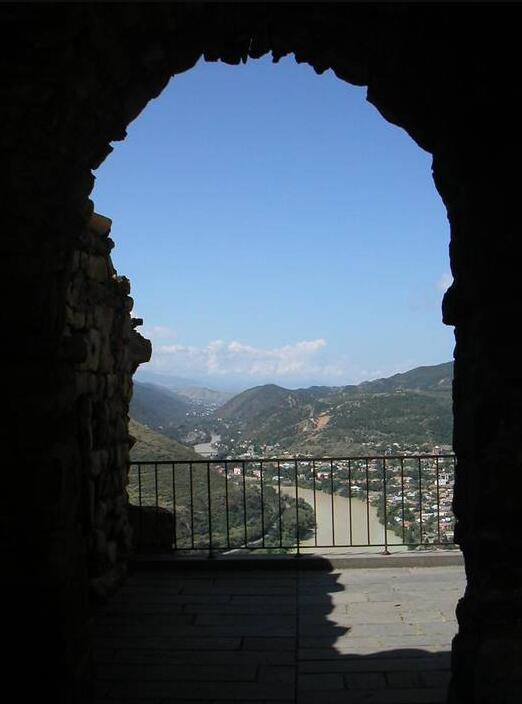Mode of Transport
When you arrive at the airport in Tbilisi, taxis (30-50 GEL), trains and buses (N 37 0.5 GEL) drive into the city, from where you can take buses to other places in Georgia. The largest bus stations in the country are Okriba, Ortachala and Vagzali. If you land at night due to limited public transport, a taxi is often the only option to get directly to your destination.
The most common means of public transport in Georgia and the Caucasus is the marshrutka – a minibus with 12-14 seats that can be stopped in rural areas with a show of hands. The tightly fitted seats offer limited seating comfort, but you can get almost everywhere cheaply. The costs for the city center are approx. 20 cents, for journeys on country roads € 5 to € 8.
For longer distances (more than 25 km) you should avoid taxis, but rent a vehicle with a driver from a tourist office or travel by bus or train.
Information about the railway is available from: Information Center: +995 32 56 62 53; +995 32 56 47 60
According to naturegnosis, the Georgian metro (METRO) is one of the safe means of transport, but it is only available in the capital. In an emergency or if you need information, you can call +995 32) 357 777
The unpredictable behavior of many road users means that European drivers need to get used to the traffic in Georgia. We therefore recommend hiring a local driver with your own vehicle. Rental cars are available at Tbilisi Airport.
Road conditions
Although Georgia is no bigger than Bavaria, the travel times should not be underestimated. The main roads are mostly well developed, but the country is extremely mountainous and sheep or cows can hinder progress on side roads. Topographical conditions and road connections do not allow all possible route combinations. Always respect restricted military areas. Distances are used for orientation, but take more time than in Germany. Roads are winding, great differences in height have to be overcome. Acclimatization should not be underestimated. In the mountain regions you should travel with enough supplies as shopping opportunities are limited. Small gifts are welcome everywhere.
Anyone prone to motion sickness should take appropriate medication with them and take precautions in good time. Local knowledge is essential for trekking and horse-riding tours in the Caucasus. Large parts of the Svaneti, Tusheti and Chevsureti region are still undeveloped and wild. If you want to reach remote places, you should definitely hire a mountain guide. Renting a horse costs around € 20-30. The tour operator ” Caucasus Travel ” has particular experience.
Clothing and equipment
Good clothing, especially sturdy shoes, is very important when traveling to Georgia. Whether you go to the mountains or to the plains, you should also take warm clothing with you in summer, because not only at night there are large temperature differences depending on the region. While it can get very hot in Tbilisi in summer (38 degrees C), there is often still snow in some mountain regions.
When visiting churches and mosques, strict clothing rules apply: women should have their knees and shoulders covered. In mosques, the headscarf is compulsory and shoes are taken off. You can often borrow towels free of charge. Basically, you should avoid shorts and very “revealing” clothing outside of the seaside resorts and the capital.
In the higher mountain regions of the Caucasus, above 2,500m, there is hardly any firewood (vegetation boundary). It is important to have a gas or gasoline stove with you when you are in full swing. The equipment necessary for mountain tours can also be obtained in Tbilisi. Gas bottles, camping equipment, and trekking clothing are often available to borrow on site. If you want to access experience reports, the ” World Travel Forum ” website is well advised.
Georgia is not a cheap travel destination. The prices for western products are at the German level, the prices for accommodation are high for the standard offered, while the local products on the markets are cheap. Prices for private offers are not fixed prices – are negotiable. Fuel prices in Georgia (roughly estimated) are half as high as in Germany
Accommodation options
There are numerous hotels in various categories in Tbilisi. The prices range from € 25 (one way) to € 200 per night (e.g. Hilton, Meriot, Sheraton). Guesthouses and private rooms are very popular and much cheaper (prices from € 10 to € 30 pp), but sometimes these are not of Central European standards and you should be prepared to make a few compromises. Tried and tested offers can be found on the Georgia websiteby Irma Berscheid-Kimeridze. In the mountain regions there are usually no hotels of Central European standards outside of the ski areas. Here one is dependent on private accommodation or guest houses. Overnight stays in the mountains should always be agreed with full board in the Caucasus. This saves you a lot of problems with the procurement of food. At the same time, you can arrange to bring special foods that are difficult to get on site. So you have a gift at the same time.
If you are going to live in Georgia for a longer period of time, you should ensure that the apartment is well secured. This also includes a good neighborly relationship, because social control is common and offers protection!
“Everyone has to…”: There are no or only inadequate public toilets on the country roads throughout Georgia. Good “leg condition” is required. If necessary, you can use the toilets of restaurants. But discretion is required! Men ask men, women ask women about “that certain place”. Your own paper and hygiene towels are a MUST.
